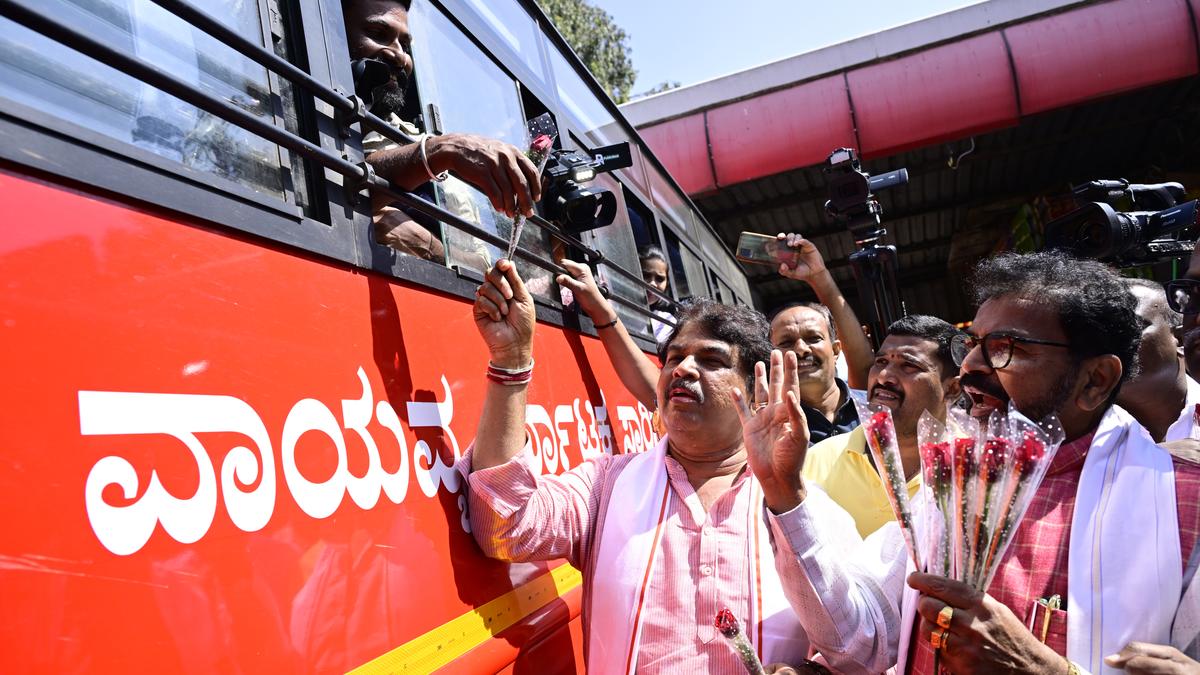 |
|
The recent decision by the Karnataka State Cabinet to increase RTC bus fares by up to 15% has sparked widespread protests, with the BJP leading the charge. On Friday, at Kempegowda Bus Station, prominent BJP leaders R. Ashok and Chalavadi Narayanaswamy staged a unique demonstration, handing out roses to male passengers while simultaneously apologizing on behalf of Chief Minister Siddaramaiah for the fare increase. This symbolic gesture highlighted the BJP's contention that the government's decision to provide free bus travel for women while significantly increasing fares for men is discriminatory and unfair. The contrast between free travel for women and the substantial fare hike for men forms the core of the BJP's criticism, framing the move as a politically motivated decision rather than one based on sound financial planning or equitable transportation policy.
The protest, however, did not unfold without incident. A heated exchange erupted between the BJP leaders and the police, who attempted to intervene and halt the demonstration. Mr. Ashok, a former Home Minister, strongly refuted the police's intervention, asserting that the protest was peaceful and that they had obtained the necessary permissions. His assertion of prior experience in the Home Ministry added an element of political tension to the confrontation, suggesting that the police action was politically motivated rather than a necessary measure to maintain order. The ensuing conflict underlines the deep-seated political divisions underlying the protest and highlights the heightened tensions between the ruling party and the opposition in Karnataka.
Beyond the immediate protest, the BJP's criticism focuses on the broader financial implications of the government's policies. Mr. Ashok accused the government of systematically increasing taxes and fares across various sectors – fuel, power, registration fees, excise tax, and now bus fares – to fund its ambitious guarantee schemes. He argued that this approach essentially amounts to taking money from the citizens to redistribute it through the schemes, characterizing it as a deceptive practice that places an undue burden on the population. The accusation paints the government's financial strategy as unsustainable and unfair, questioning the ethics of prioritizing the implementation of guarantee schemes over responsible fiscal management and the financial well-being of the common citizen. The criticism extends beyond the immediate fare hike, encompassing a wider critique of the government’s overall financial strategy and its impact on the populace.
The controversy surrounding the fare hike extends beyond the immediate political sparring. The issue has significant implications for the daily lives of ordinary citizens, especially those who rely on public transport for their commuting needs. The increase in fares could disproportionately affect low-income individuals and families, forcing them to make difficult choices between essential needs. This socio-economic impact of the fare hike adds another layer of complexity to the debate, shifting the focus from pure political posturing to the tangible consequences faced by everyday citizens. The BJP's actions, while politically motivated, have effectively brought attention to the potential hardship experienced by the public due to the price increase.
Furthermore, the incident highlights the challenges faced by governments in balancing fiscal responsibility with the delivery of social welfare programs. The government's justification for the fare increase likely stems from the need to fund its various initiatives, while the BJP's opposition emphasizes the economic burden it places on citizens. This conflict underscores the inherent tensions between social welfare commitments and responsible financial management, highlighting the difficulty in devising policies that effectively address both aspects without creating political friction or widespread public discontent. The ongoing debate illustrates the complexity of navigating these competing priorities and the need for a more comprehensive and transparent approach to policy-making that considers the needs of all stakeholders.
In conclusion, the BJP's protest against the RTC fare hike in Karnataka represents more than just a political maneuver. It underscores deeper concerns about fairness, financial accountability, and the potential socio-economic impact of government policies. The rose-giving protest, the heated confrontation with the police, and the broader critique of the government's financial strategy all contribute to a complex picture of political maneuvering, public discontent, and economic pressures within the state. The incident serves as a case study in the intricate interplay between political action, public opinion, and the practical challenges of governing in a diverse and demanding socio-economic environment.
Source: BJP gifts roses to male RTC bus passengers to protest against fare hike
